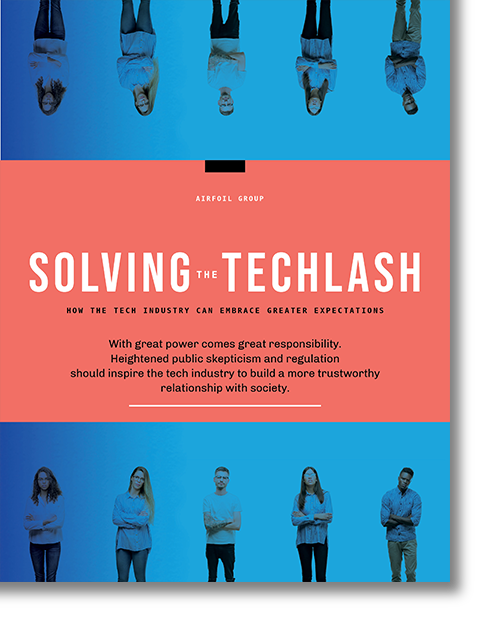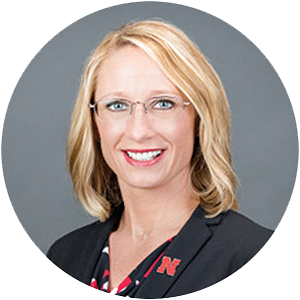
Do people trust your brand? For communicators, establishing a foundation of trust with your target audiences builds loyalty and safeguards the reputation of your brand. Yet, for those in the tech industry, public faith continues to wane as consumers become more skeptical, regulations tighten, and scandals, schemes, and breaches take the spotlight.
The tech industry has proven its products can achieve massive global and societal impact – and quickly. Now, the industry is the victim of its own success.
Whether it’s due to a natural human reaction to companies that have quickly gained immense power or thanks to the negative news cycles overshadowing innovations, growing skepticism and calls for regulation have always been part of massive industry growth.
As other industries have experienced in the past (think banks or politicians), a growing number of people are cautious of the tech industry and are beginning to ask tough questions. This public backlash has been dubbed the Techlash.
But, all is not lost. There are best practices for reestablishing and fostering consumer trust. In this report, you’ll learn:
Many of the tech companies that set out to “change the world” have done just that – often in unexpected and unintended ways. These organizations have succeeded by adopting cultures designed to inspire and reward rapid innovation above all else.
However, the same culture that has helped scrappy startups excel probably shouldn’t apply to some of the most influential companies in today’s world -- and consumers are noticing.
From professors to professionals, the experts all agree: it’s impossible to please everyone, but there are still great opportunities for businesses and communicators to develop trustworthy connections with core audiences.

Matthew W. Seeger, Ph.D., is the dean of the College of Fine, Performing and Communication Arts at Wayne State University.
“The public relations function can serve as the ethical and moral compass for organizations. PR professionals need to embrace that, which will require difficult conversations and decisions about how organizations will operate. They need to have a seat at the top decision-making tables to ensure reputational issues are in the foreground.”
Dr. Shari Veil is the incoming dean of the College of Journalism and Mass Communications at the University of Nebraska.
“Some companies shy away from taking a stand around important values, as they fear alienating part of their customer base – but they should consider that taking a stand often attracts new business, as well.”
Keith Donovan is the president of Airfoil Communications.
“As consumers become better informed, they expect more transparency and responsiveness from the stewards of their data. To safeguard their reputations, companies need to exceed the limits of regulations and align with the social conscience and expectations of consumers.”
Angela Leon is the vice president of strategy & media relations at Airfoil Communications.
“Consumers are increasingly savvy about the products and services they use, and they expect transparency and clarity regarding data privacy and protection from the companies that make them. By showing they care about growing consumer concerns, tech executives can demonstrate leadership, align with societal values, and create a point of differentiation among competitors.”
Jon Pielak is the president of Airfoil Digital.
“As data, security, and even safety has been jeopardized, public patience has worn thin. And we’ve seen these shifts in sentiments online. In the connected world, the greatest indicators of engagement between communities and tech companies are social, commerce, and content channels. The changes in public perception are visible in unique ways.”
What to do to avoid your own Techlash
Big Tech is largely experiencing the Velcro effect: The idea that negative events in the industry’s past will affect the industry’s current and future reputation. It's essential to learn lessons from others in the industry, and have a plan in place before a crisis ever occurs.
Deeply understanding the opinions of your brand is especially vital during moments of change. From thought leadership campaigns that elevate your company’s expertise or viewpoints to awareness-generating digital advertising or a full rebrand, there are a variety of strategies you can implement for actively shaping or improving your brand's perception.
Aligning brand identity to deeper social values could drive more purchase decisions than ever before. You need to gain a deeper understanding of what consumers value, align your business goals to those principles, and create programs that celebrate development and innovation in areas such as personal data privacy, ethical values, and positive change.
Consumer trust and loyalty may take months or even years to earn, but it's easily erased in the blink of an eye. To safeguard your reputation, you need to be transparent in your media relations, social media, and digital efforts and ensure you're aligned with the social conscience and expectations of consumers.
Learn more about how to build your marketing and communications strategies to avoid techlash.
With an integrated approach, Airfoil Group will help you audit your strategy to avoid techlash and align your branding, communications and marketing efforts.
We want you to get a lot of benefit from your consultation with us. We'll structure our conversation to ensure that we:
CONTACT US
Airfoil Group
336 North Main Street
Royal Oak, MI 48067
(248) 304-1400
hello@airfoilgroup.com
© Airfoil Group. All rights reserved. Privacy Policy
WHAT WE DO
WHO WE ARE
ABOUT US
Airfoil Group is the agency for launching businesses, brands, and products. Airfoil is recognized for delivering strategic solutions built on research-driven insights and calculated creative communication risks. Airfoil’s team of progressive account professionals and vital Worldcom partners apply a multidisciplinary lens to client communication challenges. The firm develops strategies that maximize clients’ competitive advantages in local, national and global business markets, and with target audiences through traditional and emerging channels.
Airfoil is a WBENC-certified woman-owned small business (WOSB).
